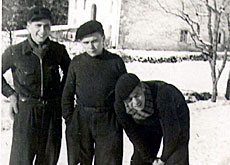Book reopens dark chapter in Swiss history

The story of a young Jewish refugee who was twice thrown out of Switzerland during the Second World War was published in November.
To mark the occasion, Joseph Spring – who was handed over to the Gestapo and sent to Auschwitz – returned to the country which expelled him.
Written by historian Stefan Keller, “The Return: Joseph Spring’s Story” recounts how Spring – aged 16 and accompanied by two cousins – crossed over the border into Switzerland in November 1943.
“They saw a light on in a farmhouse and knocked on the door,” Keller told swissinfo.
“Spring asked the farmer to take them to a phone box, but he brought them instead to the border police.”
All three were allowed to slip back into Germany, but when they returned two days later, Swiss officials handed them over to the Gestapo.
Controversial past
Keller’s book – billed as a personal account of one man’s attempt to escape Nazi persecution – deals with one of the most controversial chapters in Swiss history.
Publication of the biography comes less than two years after a final report by the government-appointed Bergier Commission, which scrutinised Switzerland’s wartime dealings with Nazi Germany, was submitted to parliament.
Headed by historian Jean-François Bergier, the report found major failings in national policy – particularly in Switzerland’s treatment of refugees and its cooperation with the Nazi regime.
Keller’s book stems from the research he conducted on behalf of a separate parliamentary committee charged with examining the cases of hundreds of Swiss who faced prosecution during the Second World War for helping refugees to flee across the border.
Personal account
The aim of his latest project, says Keller, is to shift the focus away from a broad account of the period in question.
“Historical reports tend to be very abstract – there is an ongoing debate, for example, about whether it was 20,000 or 30,000 refugees who were sent back,” Keller said.
“But my goal was to tell the story of just one who was sent back and what it meant for him.”
Spring’s two cousins – aged 14 and 21 – were sent to the gas chambers on the same day that they arrived in Auschwitz, but Joseph survived.
Return to Switzerland
Keller met the subject of his book in 1998 when Spring returned to Switzerland from his new home in Australia in search of an official apology from the Swiss government.
“When I first met him, he was a very friendly old man with a great sense of humour,” remembers Keller, “but he wanted the government to acknowledge that what had happened to him was not right.”
In 2000, Spring took his case to the Federal Court in Lausanne, and though he was granted compensation of SFr100,000 ($76,000), his appeal was turned down.
Keller is quick to point out that the subject of his narrative does not blame the country as a whole for what happened to him.
“As I talked to Spring, it became clear that it was not a question of him forgiving the country,” Keller recalls.
“Perhaps he could forgive the officials who sent him back, but I don’t think he has forgiven the government for not recognising what happened – this is probably something he will never forgive, and I can understand this.”
Rejecting criticism
Keller dismisses criticism that his book only serves to reopen a dark chapter in the country’s recent history, arguing that the Bergier Report was not – and never set out to be – the last word on Switzerland’s wartime past.
“I think that this chapter is never closed. There is no chapter in history that you can close like a book, because every generation has to build up its own opinion about the past,” said Keller.
“And behind my book is the message that it is important – indeed our duty – to take a close look at [very personal] stories such as that of Joseph Spring…which can still have some resonance today.”
swissinfo, Ramsey Zarifeh
“The Return: Joseph Spring’s Story” is the biography of a Jewish refugee who fled to Switzerland from Nazi Germany, but was twice turned away at the border.
The book’s author, Stefan Keller, based his account on interviews he conducted with the 76-year-old Spring at his home in Melbourne, Australia.
The book is published in German this month (Rotpunktverlag, Zurich, SFr23).

In compliance with the JTI standards
More: SWI swissinfo.ch certified by the Journalism Trust Initiative

You can find an overview of ongoing debates with our journalists here. Please join us!
If you want to start a conversation about a topic raised in this article or want to report factual errors, email us at english@swissinfo.ch.